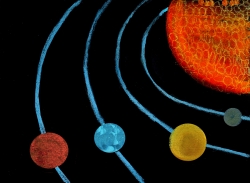Science has a lot more fights and people who lie than you might think. The way we see and understand our world is always changing, and a huge part of that comes from how scientists share what they know, fight about what they think, or just think about something in a different way from others.
Debate is a disagreement where different ideas are talked about openly. Believe it or not, but scientists love to prove each other wrong.

No matter the kind of research, scientists must share what they learned for other researchers to expand and build upon.
FotoMediamatic at Flickr.com
No matter what is being studied and looked at, scientists must share what they learned for others to add to and build upon. Talking about and sharing what you learned is key in adding to what people already know. For this reason, an important part of their work is sharing what they found and talking with others about it. They can share what they found by presenting at a meeting, but this can only reach the few people who are present. Instead, most present what they found in peer-reviewed articles that are written about in special magazines.
Peer-reviewed articles are scientific papers that are reviewed by other scientists. The people who review these papers are often someone who knows a lot about the same field of study and choose if the study should be written about. Doing this helps to make sure that what the study talked about is not copied from another person, is important, makes sense, and is not missing anything.

Scientists publish their work after peer-review.
Kate Ter Haar at Flickr.com
Scientists print and give out their work so that other people can do the study again in a same or different setting. This helps them to learn more and build upon what is already known. What every person finds should be a lot like that of that of others who did the same thing.
Validation is when the results of a study are agreed upon by other scientists who have read the study or done the same tests.

An experiment is credible if it can be repeated by others and yield the same results.
GrrlScientist at Flickr.com
There are many journals that do not use peer-review. A large number of free journals have had peer reviews, but some have not. If the study has not been reviewed, it can't be trusted and should not be used by other people. The only case that you can use that study is if someone notes that some of what they used is from a study that wasn't reviewed.
From time to time, ideas are proven wrong, and the way we view the world must change. A
paradigm is a frame through which you look at things around you. When people believed the sun and stars moved in circles around the earth, that was a paradigm. They saw that idea as truth, and this guided what people who watched the stars saw. Over time, it came to be more and more clear that the earth and other planets really moved around the Sun. First, people did not believe this new view, but over time, it became impossible to say this was wrong given the all of the clues that said this was true. When how you view the world changes, it's called a
paradigm shift. These are important acts, because they can change the way in which scientists plan out tests and people view their world or make choices.

If not for a paradigm shift, we'd have gone on believing that the Sun orbited the Earth!
Hubble ESA at Flickr.com
Scientists are always looking at new proof and new facts to make sure the way they plan out tests is correct. All the talking and fighting in among them helps us to always question the world around us.
References
Original content by Lisa Bartee and adapted by the RocketLit Staff